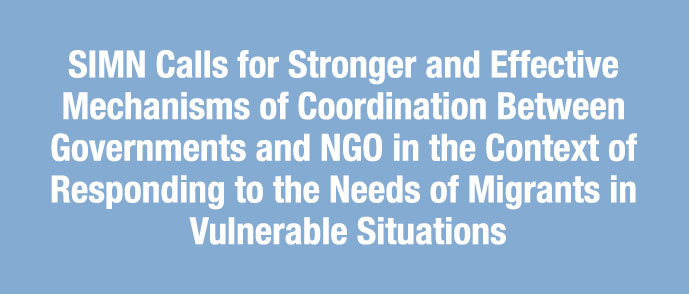New York, July 15, 2021 – Today, at the launch event of the UN Network on Migration Thematic Working Group 3 Guidance Note on Regular Pathways for Admission and Stay for Migrants in Situations of Vulnerability, Victor Genina, Director of Development and Policy of SIMN, called for stronger and effective mechanisms of coordination between governments, relevant international organizations and NGO to address the numerous and complex situations migrants in vulnerable situation face in order to obtain regular admission and stay in transit and destination countries.
SIMN signaled that the pandemics brought to light both the essentiality of migrant workers for the functioning of the economy and key sectors in destination countries, as well as their vulnerability due to lack of access to essential services, such as health care and housing. SIMN also stressed that given that the pandemic exacerbated the structural conditions that push people to leave their countries, governments should focus and do their best in implementing public policies as those recommended in the Guidance Note, based on the real needs of migrants. To further enrich the Note, SIMN made the following proposals:
- In relation to accessibility to pathways for regular admission and stay for migrants in destination or transit countries, there is a need to formalize and strengthen the already existing mechanisms of cooperation between states and civil society organizations, including faith-based organizations, oriented to start and accompany migrants in their administrative processes to obtain regular residence or work permits.
- In relation to monitoring pathways for admission and stay, SIMN proposed the design of consultative mechanisms where all stake-holders can participate to address situations of vulnerability faced by migrants in order to identify ways to improve the implementation of such policies.
- Finally, in relation to education and training, SIMN reminded Scalabrinian’s solid experience in providing certified education and training to migrants so they can integrate into the economy of host countries. This is a critical area with a lot of potential for a strengthened cooperation between governments, the private sector, international organizations, and civil society.
SIMN will continue participating in the preparatory process of the International Migration Review Process (IMRF) of the UN Global Compact on Migration (GCM), to be held next year.


